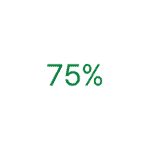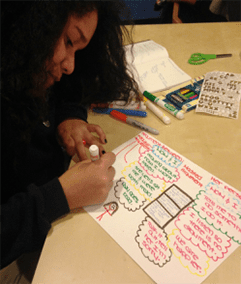Our Research Philosophy
At Hope Collaborative, we believe that there are many ways we can better understand and improve leadership development programming for youth, including the use of outcome evaluations, observational studies, randomized clinical trials, and the best in implementation science. Each of these components of research tells us something new, and together they can provide Hope a full understanding of the landscape to inform our work and outputs.






Hope Collaborative is a Massachusetts 501(c)(3) non profit that provides youth organizations with a multi-year program that leverages a world-class leadership curriculum, expert facilitators, best-practices, arts integration, technology, evaluations, and support needed to implement transformative leadership and character-building programming. Our team includes leading professionals in education, leadership development, distributed learning, marketing innovation, and youth advocacy. The Hope Collaborative program was developed by our founders. Our unique 4-year 12-module leadership curriculum is a cornerstone
asset. We developed the program in collaboration with the Clay Center for Young Healthy Minds at Massachusetts General Hospital, and base our delivery methods on best leadership development practices from leading universities and youth advocacy groups and our own ongoing results with our partners and research.
Our research shows that the right mix of skills can provide disadvantaged kids the capacity to thrive and compete. Healthy families empower young people with inner capacities for security, resilience, and self-reliance to face life’s challenges and succeed. Where that is not happening, Hope Collaborative steps in with our partners. Our distributed education programs provides skill-building workshops that strengthen a child’s core: Resilience, Conflict Resolution, Self Awareness, and Identity, to name a few.
Our partner model has attracted leading organizations around the world. Being part of this network can be an inspiring and life changing experience. We work with some of the best youth advocates. To date, partners include leading community centers and a private school in Boston, Massachusetts, a charter school in the Bronx, New York, a school recognized for excellence in rural India, a fellowship for students from Israel operating in Haifa, Israel, and a leading youth organization in Sierra Leone to name several. Hope Collaborative is growing at high speed, and now over 24,000 educators in our outreach network.
Hope Collaborative gives disadvantaged youth a sense of belonging to a community of leaders and culture of success. Youth see reflections of themselves as leaders as they connect and view educational materials and videos created by peers. We bring together youth from all around the world. For example, children in urban centers in Boston can connect with Hope
Collaborative students in a rural village in India. As Hope Collaborative grows and thrives, graduates develop a sense of kinship with their Hope Collaborative peers. They can access a network of youth leaders around the world.
Imagine if we together made leadership development a global education standard for all children living in poverty. Think about the power of youth growing up with purpose, identifying as leaders, and envisioning better futures with resilience. Children growing into adulthood using their gained skills to become key contributors in their communities, effecting powerful change, and representing a culture of leadership and social-emotional health. Picture young emerging leaders connecting, collaborating, and belonging to a large and growing community of leadership graduates from all around the world. This is the vision of Hope Collaborative.
Hope Collaborative partners with leading youth advocacy providers and community advocates that are respected worldwide for providing exceptional services to youth and families. Our education experts and partner organizations share our view that a population in trouble should be the first priority for development and better ways of distributed skill building. Hope
Collaborative is setting up distributed learning broadcast centers across a network of partners to deliver staff members and the disadvantaged youth audience cutting-edge leadership development programs.
According to census data, the 2015 poverty rate for children under the age of 18 was 1 one in every 5 children (19.7%). Young people in poverty face challenges that are overwhelming including violent neighborhoods, drug trafficking, and families that breaks down in the face of overwhelming economic challenges. Toxic stress damages neurological pathways responsible for self- management and leadership skills at an early age. Luckily, young minds have plasticity and can be transformed in healthy ways when support is available. Orlando Patterson, a world leader at Harvard University in poverty studies, suggests in his book Cultural Matrix that leadership development is one of the critical missing component of the solution to ending the cycle of chronic poverty. Michael Chu, an expert at Harvard on social innovation, reports that low-cost, scalable solutions for people living in poverty are critical components to creating communities of health.
The Hope Collaborative curriculum was developed by Hope Collaborative’s founders who are top innovators, educators, and youth development experts. Our program and evaluation consultant is the Massachusetts General Hospital
Clay Center for Young Healthy Minds. Our 4-year 12-module leadership curriculum is a cornerstone asset implemented in collaboration with the Clay Center at Massachusetts General Hospital and based on best leadership development practices from Harvard, Stanford, Yale, Wharton, and other leading institutions. The Clay Center provides critical input into our development programming to ensure our curriculum and delivery is grounded in relevant research, undergirded by effective evaluations and results tracking, and respects the behavioral and emotional state of the students we serve.
Our 4-year 12-module leadership program is a cornerstone asset based on best leadership development practices and delivery methods from leading universities and youth development institutions. We employ a rigorous and multi-faceted approach to ensure we have consistent, ongoing assessment and evaluation of the Leadership Development program. Each module originates in a set of learning goals created from leading study in social-emotional health topics, tracking to concrete skills that students can develop and practice during the program. Our learning modules include Conflict Resolution, Self-Awareness, Relationship Skills, Team Building, Empathy and Emotional Intelligence, Mindfulness and Focus, Trust and Values, Good Decision Making, Overcoming Obstacles, Self-Management, Building Self-Esteem, and Developing a Strong Identity.
Yes. Each module spans 12 weeks of programming, creating a 4-year positive youth development arc that runs 3 modules per year, infused with youth-centric storytelling, art, and creative media that support auditory, visual and kinesthetic learners while providing a fun and highly involved level of engagement. A key component is the creation of educational media (such as posters and videos) by students themselves, to then share with their communities and establish a growing resource library. Research in key areas of life-skill building such as social emotional skills and resilience suggest that young people who focus on
these developmental areas improve performance markedly in school and in their social lives. Even where low-income youth and families struggle, skills can be developed by some members to counter the deficits. Our program aims to help identify such strengths and promote them among the participants you work with. New research also credits success among disadvantaged young people who develop resilience. Previously, economic status trumped even IQ as an indicator of student achievement. Young people who failed and then learned how to rebound are shown to do better than their counterparts who may be
“smarter” and “better off” but who have not learned the same resilience.
The Hope Collaborative digital gateway represents an online resource where partners can access a network of continually growing and developing best practices, and find all they need at one centralized online site. Partners gain access to the curriculum, training, and continual support. Diverse student populations from around the world access peer-to-peer teaching materials, created by program graduates. As students progress through the program they create their own peer-to-peer products and are trained to pass on their knowledge to other youths. It is empowering for students to see reflections of themselves in images of peer leaders and materials that feel relevant to their personal lives. Student evaluations are submitted online and contribute to the ongoing assessment, program improvements, and documentation of program data and successes. In turn, when new partners sign up, they benefit from the contributions of alumni and later they themselves will also be part of the organizations continued growth and development. We are creating an ecosystem for making impact happen–and for research on best approaches.
Research Tools
- Hope Collaborative Inventory (HCI)
- Hope Change Measure (HCM)
- Hope Observational Report (HOR)







